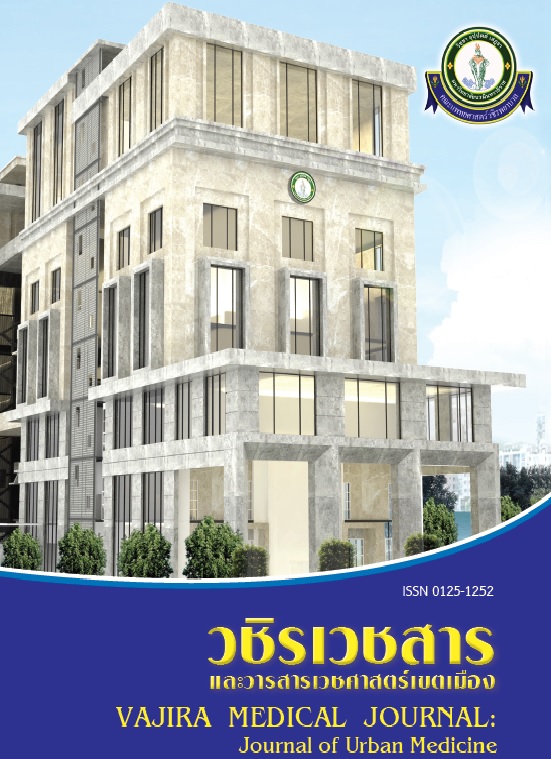Spinal Epidural Abscess Presented with Sciatica: A Case Report
Main Article Content
Abstract
Spinal Epidural Abscess is a neurological emergency which requires surgical decompression with pus drainage. Delayed diagnosis and treatment may result in disability or death. Some risk factors include diabetes mellitus, Intravenous drug use, chronic alcoholism, AIDS. The classic triad of spinal epidural abscess includes fever, back pain and focal neurological deficit. However, we describe a 65 -year-old man who had well-controlled hypertension and no previous history of back injury, who complained of sciatica pain. Physical examination revealed fever with positive straight leg raising test. The preliminary report of the blood test detected leukocytosis. MRI of thoracolumbar spine showed spinal epidural abscess. The patient underwent surgical drainage combined with antibiotic therapy for 6 weeks. His condition improved without any neurological abnormalities. Pus culture and hemoculture showed Klebsiella pneumoniae. Spinal epidural abscess from Klebsiella pneumoniae can occur in a normal host, even without a prior history of accident. The symptoms may not be specific such as fever and sciatica pain without any other neurological deficit.
Downloads
Article Details
References
2. Stephen F, Mason J, Adam E. Evaluation and management of spinal epidural abscess. J Hosp Med. 2016;11(2):130-5
3. Konstantinos B, Emmanouel C. Spinal Epidural Abscess Causing Cauda Equina Syndrome: A Case Report. Med Case Rep. 2016;2 :1-3.
4. Rosc-Bereza K, Arkuszewski M. Spinal Epidural Abscess: Common Symptoms of an Emergency Condition. A Case Report. Neuroradiol J. 2013 ;26(4): 464-8.
5. Huang PY, Chen SF, Chang WN, Lu CH, Chuang YC, Tsai NW, et al. Spinal epidural abscess in adults caused by Staphylococcus aureus: clinical characteristics and prognostic factors. Clin Neurol Neurosurg. 2012; 114: 572-6.
6. Arko L, Quach E, Nguyen V, Chang D, Sukul V, Kim BS. Medical and surgical management of spinal epidural abscess: A systematic review. Neurosurg Focus. 2014;37(4):E4.
7. Araújo F, Ribeiro C, Silva I, Nero P, Branco JC. Klebsiella pneumoniae Spinal Epidural Abscess treated conservatively: case report and review. Acta Reumatol Port. 2012;37:260-3
8. Sendi P., Bregenzer T., Zimmerli W. Spinal epidural abscess in clinical practice. QJM. 2007;101(1) 1-12
9. Machenzie AR, Laing RB, Smith CC. Spinal epidural abscess: the importance of early diagnosis and treatment. Neurol. Neurosurg. Psychiatr.1998; 65 (2): 209-12.
10. Noy ML, George S. Unusual presentation of a spinal epidural abscess. BMJ Case Rep. 2012;25: 2012.
11. Davis DP, Wold RM, Patel RJ, Tran AJ, Tokhi RN, Chan TC, et al. The clinical presentation and impact of diagnostic delays on emergency department patients with spinal epidural abscess. J Emerg Med. 2004;26(3): 285-91.
12. Epstein NE. Timing and prognosis of surgery for spinal epidural abscess: A review. Surg Neurol Int. 2015; 6(19): 475–86.
13. Chen HC, Tzaan WC, Lui TN. Spinal epidural abscesses: a retrospective analysis of clinical manifestations, sources of infection, and outcomes. Chang Gung Med J. 2004;27(5): 351-8.
14. Kim MS, Cho DC, Sung JK. Spontaneous Cervical Spondylodiscitis and Epidural Abscess Caused by Klebsiella Pneumonia-single Stage Operation with Decompressive Corpectomy and Autologous Bone Fusion. Korean J Spine. 2008;5(3):237-40.
15. Mackenzie AR, Laing RB, Smith CC, Kaar GF, Smith FW. Spinal epidural abscess: the importance of early diagnosis and treatment. J. Neurol Neurosurg. Psychiatr. 1998;65(2): 209-12.


